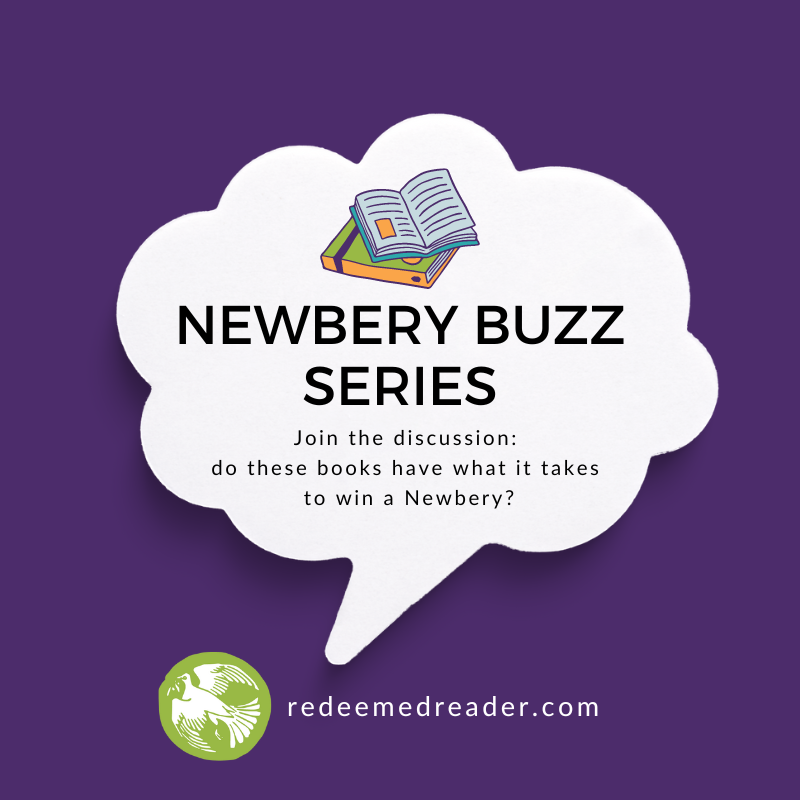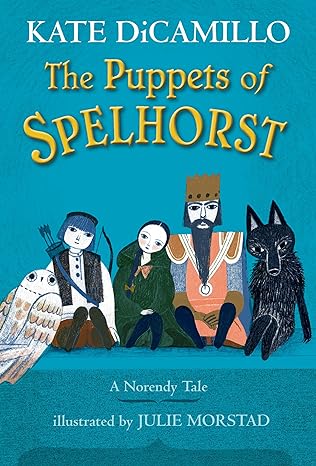Kate DiCamillo’s very first book won a Newbery honor, and she has won two Newbery medals on top of that. Is The Puppets of Spelhorst worthy of another award?
She has such a gift of telling stories that move the heart, and The Puppets of Spelhorst is the beginning of a new series that has the feel of many old world traditional tales.
For more of our discussions, visit the Newbery Buzz Page.

What does The Puppets of Spelhorst remind you of?
Janie: It was reminiscent of Andersen, I thought, though not so melancholy. There were moments of danger and moments of regret, but also touches of humor. Each of the puppets had a distinct character reinforced by repetition, as is common in folk tales. At the same time, the narrative voice is distinct and understated. That’s one thing I admired about it: how DiCamillo built her characters with great economy yet real pathos–enough to make readers feel with the poor lonely sea captain at the beginning and fear for some of the puppets when they were separated from their companions and placed in dangerous circumstances. The best fairy tales do this. There’s no specific time or place, though the narrative has a general European feel and the illustrations suggest the early 19th century. None of the characters are given a lot of backstory or drama, there’s certainly no political or social agenda. But the audience (both the reader and the audience for Emma’s story as told in the last “Act”) can still enter the story emotionally. What did you find most touching about the novel, Megan?
Megan: I hadn’t thought about the comparison with Andersen, but you’re absolutely right. I think of Andersen as a writer who not only understood that children imagine tin soldiers coming to life, but he also gave toys, household objects, and plants stories of their own. Although the human characters don’t know that the puppets of Spelhorst DO have a story and that they talk amongst themselves, the captain and the girls bond with one or more of the puppets in a truly childlike way. I found it most touching that one story almost comes full circle after the girls’ puppet show, but without the happy ending that would complete the tale in itself so that the series can continue.
The nature of puppets, dolls, and toys is that they can be almost immortal, and so they “witness” death and children growing up, and may be passed from one hand to another. The narrative voice reminds me of my favorite DiCamillo book, The Miraculous Journey of Edward Tulane, but we don’t know as much about the puppets yet. It feels like we’re planted in the middle. We know they belong together, but we don’t know their backstory, and we know there are many stories yet to come.
A story full of distinct characters
The Puppets of Spelhorst is the first in a new series of Norendy Tales. I have the 20th anniversary edition of DiCamillo’s The Tale of Despereaux on my stack, and she has a new chapter in the appendix that ties the story of Despereaux to the Norendy Tales! I’m eager to see how they unfold. Why do you think she chose the five puppets she did?

Janie: Ah! I wondered about that myself. To recap, there’s a quiet and gentle girl, an ambitious boy, a proud king, a fierce wolf, and a wise owl. These are all stereotypes, and if I had to guess as to why she picked them I’d say she wants to both disrupt the stereotypes on the way to confirming them. All are somewhat self-conscious, as if aware of what they should be and anxious to keep up appearances. especially the king and the wolf. The boy longs for adventure but doubts his courage and the owl is not quite sure of his place in the collection. The girl is the most humble, but also the most open and least doubtful. I like that she doesn’t grab a sword and take the boy’s place as adventurer. She is the least affected by the play she’s cast in. The boy, in turn, gains a sense of his abilities, while the owl gets to speak wise words, the wolf has her fierceness confirmed, and the king (cast as a wizard) learns to temper power with understanding. The play confirms all these roles, as if suggesting that we have a destiny greater than our individual selves and are most ourselves when answering that destiny together. Maybe I’m overthinking it! 🙂
What about the “real” people in the story–the sea captain, the peddler, the uncle, the maid, and the two children. How do they relate to the puppets?
Megan: I can’t think of any other books with a whole cast of characters that we know so little about, yet care about them because the author has woven them together. It’s really a story about stories and how each of our lives are part of many small stories, while there’s a bigger story that we can’t fully fathom, which is very much a Christian theme. We only learn the end of the sea captain’s story and the beginning of Jane Twiddum’s story and all that we’re going to know of Emma and Martha’s stories. It’s interesting that while the puppets MUST stay together, most of the human characters don’t. The sisters do, and their story is complete, but the others all experience loss and separation. Somehow it still has a satisfying ending, perhaps exactly because we realize that the story of both humans and puppets is somewhere in the middle, and nowhere near the end. Perhaps along the way we’ll learn something more about the mysterious puppet maker who told the boy that he had a destiny and would perform a great deed.
Does The Puppets of Spelhorst have what it takes?
So what do you think, Janie? What chance does this book have of a shiny medal from the Newbery committee?
Janie: I’ll have to say this is one of my favorite DiCamillo books, but I’d put its chances fairly low. The only “issue hook,” as I see it, is Jane Twiddums taking off on her own to see the world–kind of a “You go, girl!” development. (On the other hand, as a hired housemaid Jane doesn’t have any obligation to stay in a menial job, and she takes the puppets with her so they can see the world, too.) It’s more of an old-fashioned story than the committee lately tends to pick, and DiCamillo has won the gold twice already. I can’t think of any three-time winners offhand. The book could win a silver medal, though. What do you think, Megan?
Megan: I’d love to see this with an honor, but you’re right, it’s probably not daring enough for the committee to win the medal. It’s also unlikely that a book in a series would be picked. That’s okay; DiCamillo has plenty of genuine admirers who aren’t waiting to see if she meets the expectations of those “experts.” We know we love her stories and are eager to share them.
Readers: do you agree with us? What are your thoughts on The Puppets of Spelhorst?
For the rest in this Newbery Buzz series, past and present, don’t miss our main Newbery Buzz series page!
Stay Up to Date!
Get the information you need to make wise choices about books for your children and teens.
Our weekly newsletter includes our latest reviews, related links from around the web, a featured book list, book trivia, and more. We never sell your information. You may unsubscribe at any time.
Support our writers and help keep Redeemed Reader ad-free by joining the Redeemed Reader Fellowship.
Stay Up to Date!
Get the information you need to make wise choices about books for your children and teens.
Our weekly newsletter includes our latest reviews, related links from around the web, a featured book list, book trivia, and more. We never sell your information. You may unsubscribe at any time.
We'd love to hear from you!
Our comments are now limited to our members (both Silver and Golden Key). Members, you just need to log in with your normal log-in credentials!
Not a member yet? You can join the Silver Key ($2.99/month) for a free 2-week trial. Cancel at any time. Find out more about membership here.



